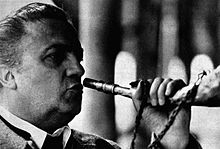Federico Fellini
Appearance

Federico Fellini (20 January 1920 – 31 October 1993) was a highly esteemed and influential Italian film director. Fellini's films typically combine memory, dreams, and fantasy. Among the best known of his films are La Strada, La Dolce Vita, 8½, and Amarcord.
Quotes
[edit]


- All art is autobiographical; the pearl is the oyster’s autobiography.
- On the autobiographical nature of his films, in The Atlantic (December 1965)
- Even if I set out to make a film about a fillet of sole, it would be about me.
- On the autobiographical nature of his films, in The Atlantic (December 1965)
- Cinema is an old whore, like circus and variety, who knows how to give many kinds of pleasure. Besides, you can’t teach old fleas new dogs.
- As quoted in in The Atlantic (December 1965)
- Talking about dreams is like talking about movies, since the cinema uses the language of dreams; years can pass in a second and you can hop from one place to another. It’s a language made of image. And in the real cinema, every object and every light means something, as in a dream.
- As quoted in Rolling Stone no. 421 (1984)
- What is an artist? A provincial who finds himself somewhere between a physical reality and a metaphysical one... It’s this in-between that I’m calling a province, this frontier country between the tangible world and the intangible one — which is really the realm of the artist.
- "Every Time We Say Goodbye" in Sight and Sound [London] ( June 1991)
- There is no end. There is no beginning. There is only the infinite passion of life.
- Fellini on Fellini (1976) edited by Anna Keel and Christian Strich; translated by Isabel Quigly.
- Cinéma-vérité? I prefer 'cine-mendacity'. A lie is always more interesting than the truth...Fiction may have a greater truth than everyday, obvious reality.
- Fellini on Fellini (1976) edited by Anna Keel and Christian Strich; translated by Isabel Quigly.
I'm a Born Liar (2003)
[edit]
- I'm a Born Liar: A Fellini Lexicon (2003) Edited by Damian Pettigrew ISBN 0306805200


- I don't believe in total freedom for the artist. Left on his own, free to do anything he likes, the artist ends up doing nothing at all. If there's one thing that's dangerous for an artist, it's precisely this question of total freedom, waiting for inspiration and the rest of it.
- "Artistic Freedom"
- I discovered that what's really important for a creator isn't what we vaguely define as inspiration or even what it is we want to say, recall, regret, or rebel against. No, what's important is the way we say it. Art is all about craftsmanship. Others can interpret craftsmanship as style if they wish. Style is what unites memory or recollection, ideology, sentiment, nostalgia, presentiment, to the way we express all that. It's not what we say but how we say it that matters.
- "Craftsmanship"
- A created thing is never invented and it is never true: it is always and ever itself.
- "Creation"
- Everyone knows that time is Death, that Death hides in clocks. Imposing another time powered by the Clock of the Imagination, however, can refuse his law. Here, freed of the Grim Reaper's scythe, we learn that pain is knowledge and all knowledge pain.
- "Death"
- The public has lost the habit of movie-going because the cinema no longer possesses the charm, the hypnotic charisma, the authority it once commanded. The image it once held for us all — that of a dream we dreamt with our eyes open — has disappeared. Is it still possible that one thousand people might group together in the dark and experience the dream that a single individual has directed?
- "Decline of Cinema"
- Experience is what you get while looking for something else.
- "Experience"
- It's easier to be faithful to a restaurant than it is to a woman.
- "Fidelity"
- No critic writing about a film could say more than the film itself, although they do their best to make us think the opposite.
- "Film Critics"
- Nietzsche claimed that his genius was in his nostrils and I think that is a very excellent place for it to be.
- "Genius"
- God may not play dice but he enjoys a good round of Trivial Pursuit every now and again.
- "God"
- Hype is the awkward and desperate attempt to convince journalists that what you've made is worth the misery of having to review it.
- "Hype"
- If I'm a cruel satirist at least I'm not a hyprocrite: I never judge what other people do. Neither a politician nor a priest, I never censor what others do. Neither a philospher nor a psychiatrist, I never bother trying to analyze or resolve my fears and neuroses.
- "Hypocrisy"
- A good opening and a good ending make for a good film provided they come close together.
- "Recipe for a Good Film"
- The young watch television twenty-four hours a day, they don't read and they rarely listen. This incessant bombardment of images has developed a hypertrophied eye condition that's turning them into a race of mutants. They should pass a law for a total reeducation of the young, making children visit the Galleria Borghese on a daily basis.
- "Younger Generation"
- I think television has betrayed the meaning of democratic speech, adding visual chaos to the confusion of voices. What role does silence have in all this noise?
- "Television"
About Fellini
[edit]- I've always written at the top of my lungs and from some secret motives within. I have followed the advice of my good friend Federico Fellini who, when asked about his work, said, "Don't tell me what I'm doing, I don't want to know."
- Ray Bradbury, "Author's Introduction" to 2003 Folio Society edition of Fahrenheit 452 (1953)
External links
[edit]- Fellini Foundation official site
- Federico Fellini on IMDb
- Various short reviews
- One of Fellini's artworks
- Images and Archetypes: A perspective on the work of Federico Fellini
- In-depth excerpt from Fellini: A Life
- Researching and documenting the influence of Fellini on popular culture
- Film Comment - Review of I'm a Born Liar: A Fellini Lexicon
- Federico Fellini: Interviews edited by Bert Cardullo
- Essay on Orchestra Rehearsal by A.Tylski
- Site Federico Fellini
- Federico Fellini: Old School Reviews


